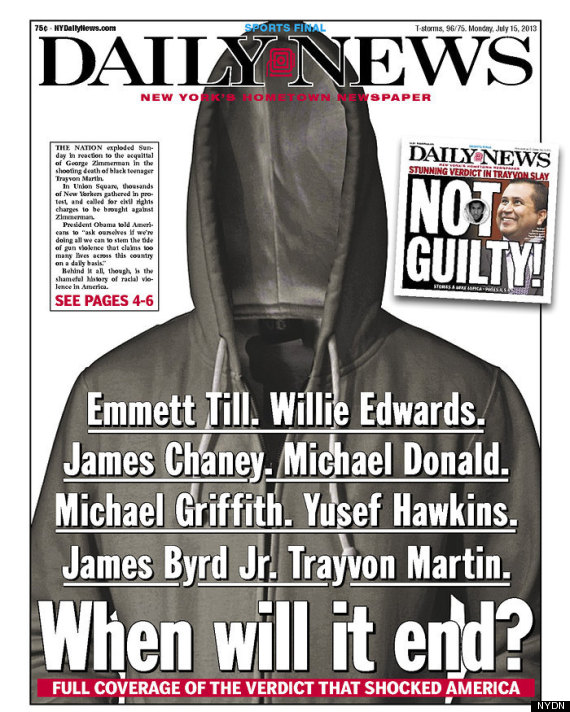
Zimmerman was found not guilty on Saturday in the killing of Trayvon Martin. The decision by a Florida jury set off a wave of protests around the country.
The Daily News explicitly linked Martin, the unarmed black teenager, to martyrs of the civil rights movement such as Emmett Till, and to black victims of hate crimes like James Byrd, Jr.
Actor Lance Gross is the latest celebrity to weigh in on the jury's decision. Gross took to his Instagram account on Sunday to share an open letter, written by Alex Fraser, that was addressed to the 29-year-old former neighborhood watchman
The Daily News explicitly linked Martin, the unarmed black teenager, to martyrs of the civil rights movement such as Emmett Till, and to black victims of hate crimes like James Byrd, Jr.
Actor Lance Gross is the latest celebrity to weigh in on the jury's decision. Gross took to his Instagram account on Sunday to share an open letter, written by Alex Fraser, that was addressed to the 29-year-old former neighborhood watchman

It's impossible to know whether it was Trayvon Martin or George Zimmerman who threw the first punch in the confrontation that ended Martin’s life. The jury apparently relied on that ambiguity to acquit Zimmerman of murdering Martin, because he said he killed the 17-year-old in self defense. But despite the confusion, there are plenty of facts that both sides can agree on. While Zimmerman may have been found not guilty, that doesn't mean he wasn't responsible. Trayvon Martin would be alive today, but for at least six decisions made or not made by Zimmerman and the state of Florida.
1. Zimmerman could have decided not to follow Martin.
For starters, George Zimmerman is not a law enforcement official trained in spotting suspicious or criminal behavior. Zimmerman told a 911 operator that Martin seemed suspicious and appeared to be "on drugs or something. It's raining and he’s just walking around, looking about." It was not 3 a.m. when Zimmerman spotted Martin. Rather, it was early evening, a time when people typically "walk around, looking about." Had Zimmerman simply gone about his business, we never would have heard about either of them.
2. Zimmerman could have listened to the 911 operator and not followed Martin.
Talking to an operator, Zimmerman complained, "These assholes, they always get away." He later narrated, "Shit, he's running.”
"Are you following him?" the operator asked.
Zimmerman confirmed he was. "Ok, we don't need you to do that," the operator told him. If Zimmerman had simply let Martin run away, he'd be alive today. Martin, it later emerged, found Zimmerman as deeply suspicious as Zimmerman found him. Only one of those judgments turned out to be correct.
3. If Zimmerman had not been secretly armed, he probably wouldn't have followed Martin.
Zimmerman knew that he had an advantage in any possible confrontation with a neighbor: He was concealing a weapon. If a fight started, and Zimmerman began losing, he could pull out the gun and shoot his opponent. The state of Florida allows Zimmerman to patrol his neighborhood armed, which emboldened him.
4. If Zimmerman's weapon had not been hidden, Martin probably would have dealt with him differently.
When a man follows another, tensions rise. One way or another, those tensions led to a physical confrontation. But if Florida law barred concealed carry, Martin would have been able to see that Zimmerman was armed. Zimmerman defenders suspect Martin threw the first punch. But even if that's true, would he have done so if he knew Zimmerman was carrying a loaded weapon?
5. Zimmerman could have been barred from carrying a weapon.
Zimmerman had a long history of violence, including a restraining order for domestic violence, felony charges of resisting arrest, and assaulting an officer (the charge was pled down to a misdemeanor and then closed; Zimmerman's dad was a magistrate at the time). He was bounced from a job as a bouncer for being too aggressive with patrons, the New York Daily News reported. And a family member accused him of a pattern of sexual molestation. He wasn't convicted of any felony charges, which could have barred him from a gun license, but in some societies, people would determine that such a history makes someone less than an ideal candidate for the right to carry around a hidden loaded weapon.
6. Zimmerman could have not shot and killed Martin.
Regardless of who threw the first punch, a series of aggressive decisions by Zimmerman led toward the fight that broke out. Zimmerman therefore bears some responsibility for the altercation. If one starts a fight and loses, the result is generally a bloody nose, a fat lip, a black eye, a concussion or even a broken bone. That's the price one pays for getting into a fight, and it tends to be a deterrent to starting a fight. Zimmerman could have chosen to take his lumps and rethink the decisions he had made that landed him where he was. Instead, he pulled out his gun, squeezed the trigger and killed Trayvon Martin.
Of course, there's a seventh decision that could have been made that night --Trayvon Martin could have chosen to not defend himself.
It's important to note that the jury's verdict sends a message to anyone confronted or pursued by another man: If you engage the confrontation, even an act of self defense could be used as justification to shoot and kill you. What led up to the confrontation in the Martin-Zimmerman case was ruled irrelevant; only Zimmerman's state of mind at the time he shot him was to be taken into account by the jury. That doesn't leave someone being followed through their neighborhood many options other than fighting back.
This is so sickening. If anyone dares shoot my relative and is let free in a court room..am pretty sure am gonna shoot the bastard pronto and claim temporary insanity..Pscheeww.
ReplyDelete